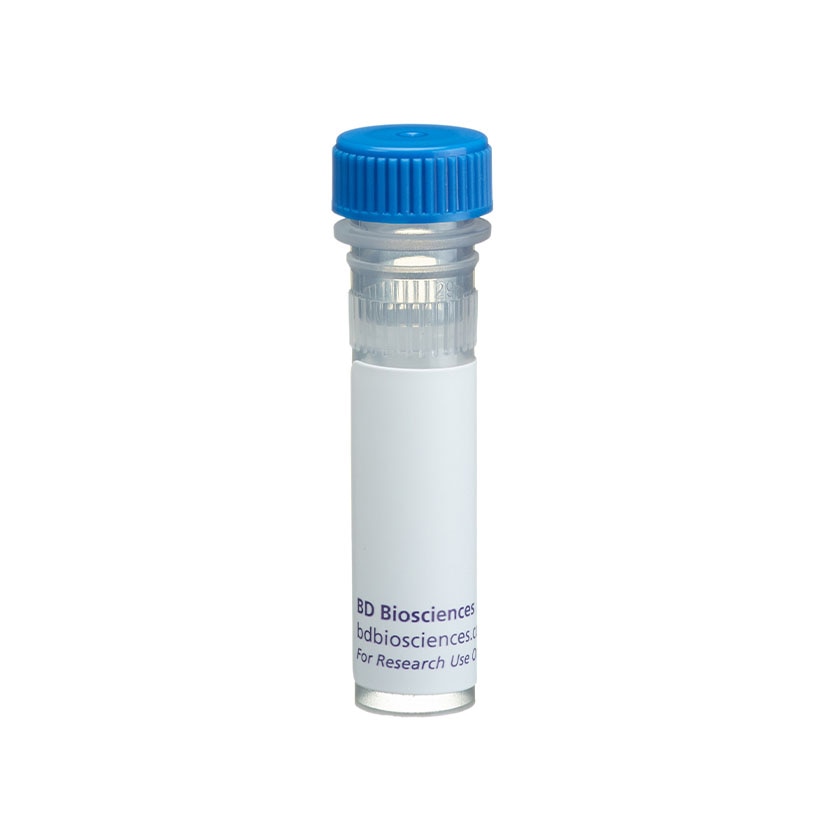Old Browser
This page has been recently translated and is available in French now.
Looks like you're visiting us from {countryName}.
Would you like to stay on the current country site or be switched to your country?




Flow cytometric analysis of CD226 expression on human peripheral blood lymphocytes. Whole blood was stained with either Purified Mouse Anti-Human CD226 (Cat. No. 559787; solid line histogram) or Purified Mouse IgG1 κ Isotype Control (Cat. No. 555746; dashed line histogram), followed by FITC Goat Anti-Mouse IgG/IgM (Cat. No. 555988). Erythrocytes were lysed with BD Pharm Lyse™ Lysing Buffer (Cat. No. 555899). Fluorescent histograms were derived from gated events with the side and forward light-scattering characteristics of viable lymphocytes.


BD Pharmingen™ Purified Mouse Anti-Human CD226

Regulatory Status Legend
Any use of products other than the permitted use without the express written authorization of Becton, Dickinson and Company is strictly prohibited.
Preparation And Storage
Product Notices
- Since applications vary, each investigator should titrate the reagent to obtain optimal results.
- An isotype control should be used at the same concentration as the antibody of interest.
- Caution: Sodium azide yields highly toxic hydrazoic acid under acidic conditions. Dilute azide compounds in running water before discarding to avoid accumulation of potentially explosive deposits in plumbing.
- Sodium azide is a reversible inhibitor of oxidative metabolism; therefore, antibody preparations containing this preservative agent must not be used in cell cultures nor injected into animals. Sodium azide may be removed by washing stained cells or plate-bound antibody or dialyzing soluble antibody in sodium azide-free buffer. Since endotoxin may also affect the results of functional studies, we recommend the NA/LE (No Azide/Low Endotoxin) antibody format, if available, for in vitro and in vivo use.
- Please refer to http://regdocs.bd.com to access safety data sheets (SDS).
- Please refer to www.bdbiosciences.com/us/s/resources for technical protocols.
The DX11 monoclonal antibody specifically binds to CD226 which is also known as DNAX accessory molecule-1 (DNAM-1), Platelet and T cell activation antigen 1 (PTA1), or T lineage-specific activation antigen 1 antigen (TLiSA1). CD226 is a 65 kDa type 1 transmembrane glycoprotein consisting of 318 amino acid residues including two Ig-like domains. CD226 is expressed on the majority of T cells, NK cells, monocytes, platelets, and a subset of B cells, but not on erythrocytes. It is also present on a subset of thymocytes coexpressing high density surface CD3. CD226 is not present on normal fibroblast cell lines or tumor cell lines of epithelial or neuronal origins. CD226 is a tyrosine phosphorylated, signal-transducing molecule which participates in primary adhesion during cytotoxic T lymphocyte (CTL)- or NK cell-mediated cytotoxicity. The DX11 antibody inhibits T- and NK cell-mediated cytotoxicity against a variety of tumor cell targets, and blocks cytokine production by alloantigen-specific T cells.
Development References (2)
-
Shibuya A, Campbell D, Hannum C, et al. DNAM-1, a novel adhesion molecule involved in the cytolytic function of T lymphocytes. Immunity. 1996; 4(6):573-581. (Clone-specific). View Reference
-
Shibuya A, Lanier LL, Phillips JH. Protein kinase C is involved in the regulation of both signaling and adhesion mediated by DNAX accessory molecule-1 receptor. J Immunol. 1998; 161(4):1671-1676. (Clone-specific). View Reference
Please refer to Support Documents for Quality Certificates
Global - Refer to manufacturer's instructions for use and related User Manuals and Technical data sheets before using this products as described
Comparisons, where applicable, are made against older BD Technology, manual methods or are general performance claims. Comparisons are not made against non-BD technologies, unless otherwise noted.
For Research Use Only. Not for use in diagnostic or therapeutic procedures.
Report a Site Issue
This form is intended to help us improve our website experience. For other support, please visit our Contact Us page.